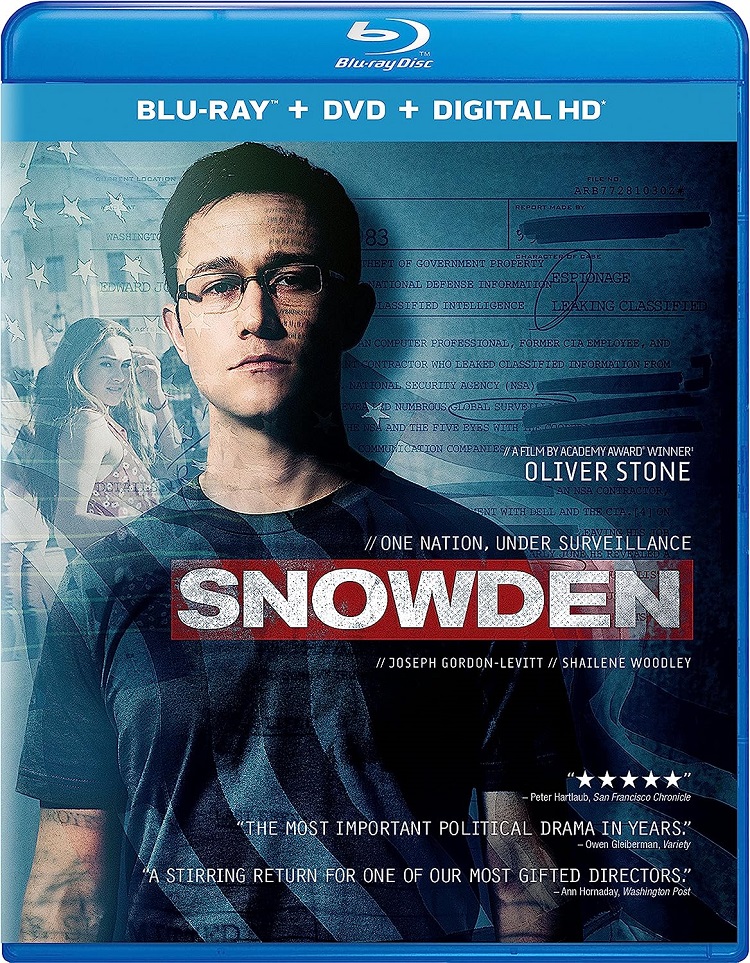
Of course Oliver Stone made a movie about Edward Snowden. If the former CIA operative/NSA contractor turned whistleblower/leaker of thousands of documents that prove our government has been spying on its citizens on a massive scale didn’t actually exist, he’s exactly the sort of character a guy like Stone would have invented. Likely, we critics would have complained that he was being too paranoid if he did.
This fictionalized biopic is framed by the non-fictional film Citizenfour, which won the Academy Award in 2015 for best documentary feature. Snowden begins with Edward Snowden (Joseph Gordon-Levitt) meeting with Citizenfour‘s director Laura Poitras (Melissa Leo) and Guardian reporter Glenn Greenwald (Zachary Quinto) in a Hong Kong hotel. There, Snowden discusses the releasing of the NSA documents he took from their base in Hawaii. Two sets of flashback sequences fill in Snowden’s professional life and his relationship with girlfriend Lindsay Mills (Shailene Woodley).
It is the scenes with the girlfriend that become the most problematic, storytelling wise. It’s understandable that they used that relationship to humanize Snowden and to turn some of the action away from him staring at computer screens, but they add nothing new to the film. We’ve seen the suffering girlfriend with a stressed-out, never-available partner too many times to make it interesting here. Shailene Woodley does her best with what she’s given but her character isn’t fleshed out enough to give the character much depth or import. This dual flashback structure likewise dulls any suspense or drama that the main story builds.
Joseph Gordon-Levitt is excellent as Edward Snowden. We spend a great deal of time staring at his face as he’s exposed to all of the covert spying the United States government is actually doing, and we see every nuance of emotion, every thought process written in his expressions.
Oliver Stone has made a career of documenting relatively recent American history from the Vietnam War to the terrorist attacks on 9/11 and the lives of two presidents (and the assassination of another). Throughout the ’80s and early ’90s, he consistently made thought-provoking films that deep dived into the American psyche. Since about 1997 starting with Any Given Sunday, he’s floundered a bit, but with Snowden, I’d say he’s back.
There are hints of his film JFK all over Snowden. Like that presidential assassination, the revelations that our government is spying on us – not just suspected terrorists, but all of us – has ripped a deep tear into our cultural identity. This post-9/11 world is an Orwellian nightmare come true and Snowden showed all those tin-foiled-hat nutters out there that may they actually are onto something. Stone infuses his film with levels of paranoia that don’t quite reach the levels he climbed in JFK but echo them. His hand as director is always steady and and his craft hasn’t been better in years.
Unfortunately, the story he’s telling never quite lives up to that craft. Ultimately, Snowden is a pretty standard biopic about a man who remains in the national spotlight and whose life has been regularly covered by the daily news. I’m not one who has more than a cursory knowledge of Edward Snowden outside of the headlines and while I certainly had blank spaces filled in for me by watching the film, I’m not sure that it’s led me to care. What Snowden revealed is deeply important and his actions continue to provoke enraged conversations that our country desperately needs to have. I’m just not sure a dramatized version of him fighting with his girlfriend sheds any light on the matter.
I’m perhaps being overly harsh. Snowden is a good movie and it’s great to see Oliver Stone working at full force once again; I just wish the story he was telling had more to say.
Snowden Live was a special early showing of the film that included a live interview with Oliver Stone, Shailene Woodley, Joseph Gordon-Levitt, and via internet from Moscow, Edward Snowden himself. It was moderated by RoberEbert.com Editor-in-Chief Matt Zoller Seitz. It was an interesting interview though a disjointed one. After asking Edward Snowden a few precursory questions about what it’s like to have a movie star portray him, Zoller talked to him more journalistically about privacy issues and how to protect yourself. At the same time, he’d turn himself to question the cast and director about their art and the filmmaking process. All the questions were on point but going from more serious questions about real-life issues to making movies made the experience a bit weird.
Snowden is certainly a film worth seeing. It definitely humanizes a man who has been called everything from the devil to savior. Getting to hear from him and the creators of the movie in a live setting made it all the better.